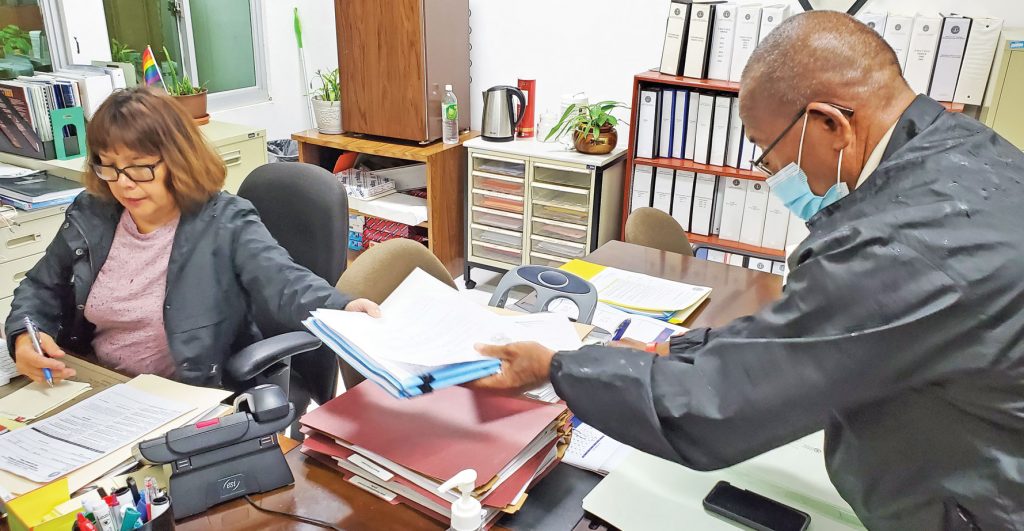$144.8M budget bill now with Torres

House of Representatives sergeant-at-arm Pedro Towai hands over the Legislature-approved copy of the budget bill for Fiscal Year 2022 to Amelia Shai, the special assistant for programs and legislative review, at the Governor’s Office yesterday at 2:34pm. (FERDIE DE LA TORRE)
The budget bill is now on the desk of Gov. Ralph DLG Torres after the House of Representatives adopted yesterday afternoon the final “product” of the bicameral conference committee that worked out a $144.84-million budget for CNMI government operations for fiscal year 2022.
Combining the general fund and the $175 million allocated to the CNMI in the American Rescue Plan Act, the CNMI government will have at its disposal a total of $278,384,323 for government operations in the new fiscal year.
All 17 representatives present voted “yes” to adopt the conference committee’s report during a regular session at the House chamber. Reps. Joseph Flores (Ind-Saipan) and Richard T. Lizama (D-Saipan) were absent.
Soon after House Speaker Edmund S. Villagomez (Ind-Saipan) declared the passage of budget legislation, he asked the chamber, “Did I hear a clap?”, prompting claps and cheers from representatives and some House staff.
The House entertained only the budget bill at the session because of yesterday’s tropical depression.
The full Senate adopted the conference committee’s report and passed the budget bill last Tuesday.
The budget bill is House Bill 22-72, in the form of HD3, SD1, Conference Committee Substitute 1.
After Villagomez signed the budget bill, House’s sergeant-at-arms Pedro Towai immediately transmitted a copy of the bill to the Governor’s Office yesterday at 2:34pm. Amelia Shai, the special assistant for programs and legislative review, received the copy of the bill. Shai was the only person at the Governor’s Office at the time as government offices had been closed down starting at noon yesterday due to the bad weather.
Torres has to sign the bill before the fiscal year ends on Sept. 30, 2021. Without a budget bill for the new fiscal year, the CNMI government will be forced to have a partial shutdown.
In a later interview, Villagomez said he is happy with the smooth conference committee meeting, which took only a little over two hours and led to the quick passage of the budget bill yesterday.
Villagomez said the conferees compromised and reached an agreement. “That’s pretty smooth. As a matter of fact, some of the constituents were thinking they [conferees] we’re still meeting,” he said.
Villagomez said the goal of the conference committee meeting was to meet for just two to three days at the most, and they did it in less than three hours. “So that’s what I call smooth,” he said.
Ideally, the governor should be granted 20 days to sign an appropriations bill, Villagomez said, but this bill will still give him eight days to review it.
Villagomez said they did try to meet the 20-day target but the House and Senate each had their own goals in terms of how they want this budget to work out.
“If anything, at least he has eight days and not three hours. I am happy with how it turned out,” he said.
Villagomez said things can always come up better but there were circumstances that came out, like the administration had to resubmit a revised budget last July 1. “So we had to work from there and also scheduling and on all those things,” he added.
Rep. Donald M. Manglona (Ind-Rota), who chairs the House Ways and Means Committee and was the chairperson of the House’s conference committee, thanked the conferees from both the House and Senate, the legal counsels, and all those who played a role in the planning and preparation for the passage of the conference committee’s report.
Manglona said the report addresses the concerns of the House and the Senate’s version of the budget. “We took all amendments into consideration and, in the end, we adopted changes that we were all satisfied,” he said.
He pointed out the work that the committee has done to ensure that there is still accountability and transparency of the way these funds will be spent.
“We included provisions that require quarterly reporting. We emphasize overtime payment, and that those are only restricted to those who are eligible to receive,” he said.
Manglona said they supported the Senate with providing additional funds to the Public School System for textbooks, among other things.
Most importantly, Manglona said, any changes made to the governor’s spending plan for the American Rescue Plan Act funds will require a joint resolution by both House and the Senate.























